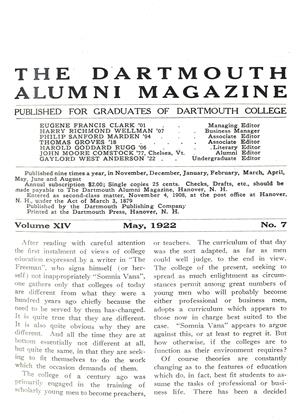At the request of the editor, Charles H. Donahue '99 has prepared the following account of the very successful seriies of luncheons just concluded in Boston:
It was a ribald and literal New Yorker who questioned the drawing power of the name of the "Lenten Luncheons" which for the last three years have occupied the calendar of the Dartmouth Club of Boston on the Tuesdays in the month of March. For his benefit it may be said that the name was not chosen as descriptive of the bill of fare, but because it was .pleasingly alliterative, and, to pious Bostonians at any rate, of definite chronological, rather than entirely of gastronomical, significance.
In these days of scattered suburban homes, dislike of formal functions, sporadic railroad transportation after dark and constitutional amendments, it is difficult to get a large Dartmouth crowd into the city to dinner more than once a year. The Lenten Luncheons were an experiment on the theory that men would gladly give an . hour and a quarter at noon time once in a while just to. be in a Dartmouth crowd. The result has proven the correctness of the theory, for each luncheon has had a larger attendance than the one before it, and if there were 52 weeks in Lent rather than six, the final luncheon of the year would have to served in a tent on the Common.
Further than this the luncheons sought to extend the acquaintanceship of Dartmouth men; for increasing knowledge of each other, the distinctive characteristic of Dartmouth alumni life is the constant aim of alumni organization and effort. In this instance in the selection of the single speaker at each luncheon the particular aim was to further the acquaintance of the alumni with men among them whose personalities, achievements or views on matters of pertinence and interest should be better known.
The plan of the luncheons has also permitted the development through successive weekly speakers of a general theme, with its variations handled by men especially qualified. For instance, the schedule this year dealt with the relations of the alumni to other constituent parts of the great whole which is Dartmouth. On March 7, James H. Kimball, 1901, spoke on "The Alumni and Dartmouth Out of Doors." Jim was himself, which for anyone else would be superlative praise, and under a barrage of illustrative incidents drawn from the life and times of himself, family and friends, carried to his hearers a clear conviction of their distributive share in the great out of doors domain of Dartmouth. Jim was followed on March 14 by Charles G. Dubois, 1891, with the topic "The Alumni and the Undergraduates." He made us see what we need to see, that as ancestors of former generations the mental and vocal attitudes of the alumni toward the college have their reactions on the undergraduate body and that as forefathers we owe our collegiate offspring that one remaining use for latterday setting of a good example.
A week later, March 21, Harry Wellman, 1907 played the symphony of "Dartmouth, Past, Present and Future," to the theme that as the College now dwelling in many buildings was the same as when housed in a few, so the students, though differently garbed and with other interests in leisure time, are at heart and soul the same. And then, extemporizing, he played us a rhapsody of a physical Dartmouth of the future with its seniors cloistered together in a dormitory for the last year of their vigil preparatory to Knighthood; but through it all ran the little melody, "The men are the same, the men are the same."
The luncheons this year closed gloriously on March 28, Joe Gilman speaking on "The Alumni and Dartmouth Athletics." As stockholders in the great corporation of Dartmouth Alumni Interests we heard the report of one of our directors on a subject of general concern. Present conditions and future prospects were laid before us in a straight-forward and convincing manner. The. sanity as well as the vision of our athletic representatives left us enthusiastic an satisfied that the present widespread disapproval of collegiate athletics had no origin in and would have no harmful effect on our athletic interests.
It is planned to continue the "Lenten Luncheons" next year. They are good for the soul and we recommend to Mr. Manhattan that he try them out at his new Dartmouth Club of New York. He will find, we believe, from our experience, that a "Lenten Luncheon" instead of being a fast is a feast.
 View Full Issue
View Full Issue














